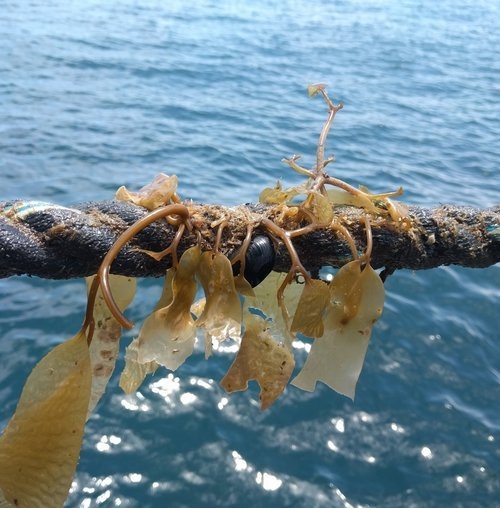
Pioneering offshore mussel farm scores another industry first
November 2, 2017
By ANA
The first offshore shellfish farm permitted in Unites States federal waters bagged roughly $450,000 in funding from the US Department of Energy to start giant kelp (Macrocystis pyrifera) farming for human and animal consumption and for feedstock.
 First kelp planted in US federal waters. Catalina Sea Ranch is developing a nursery and planting program to evaluate the potential and practicality of giant kelp as a new sustainable marine crop
First kelp planted in US federal waters. Catalina Sea Ranch is developing a nursery and planting program to evaluate the potential and practicality of giant kelp as a new sustainable marine crop Catalina Sea Ranch’s seaweed farm project is one of 18 beneficiary projects aimed at helping to improve US energy security and economic competitiveness. Macroalgae can be utilized as a feedstock for domestic transportation fuels, chemicals and other commercial products without competing with food crops for land and water, according to the Advanced Research Projects Agency-Energy (ARPA-E), which provided the funding.
“From Alaska to the Gulf Coast, the United States has offshore resources capable of producing enough seaweed to handle as much as 10 percent of our demand for transportation fuel,” said ARPA-E Acting Director Eric Rohlfing.
“By focusing on the technological challenges to growing and harvesting macroalgae efficiently and cost-effectively, MARINER project teams are building the tools we need to fully put this resource to work contributing to our energy future.”
To make monitoring of the offshore farm more energy efficient, Catalina Sea Ranch is developing a $150 prototype sensor that will remotely measure the water’s salinity, currents and nutrients, among others. “This couldn’t have been done four years ago,” ranch founder Phil Cruver told the Daily Breeze. “Because of cellphones, the price of microprocessors and storage have just plummeted. The cheapest (device) that measures the amount of phytoplankton is about $3,000. We’re developing a prototype for $150.”
The 100-acre Catalina Sea Ranch is located about six miles off the coast of Huntington Beach, California. Its bread and butter is mussel farming; it is designed to produce 2 million lbs of mussels per year initially. The goal is to eventually expand the ranch to 1,000 acres and 20 million lbs of mussels per year.
Advertisement
- Study: Only one percent of packaged seafood in Canada is fake
- Shellfish industry, community align efforts to clean up shores





